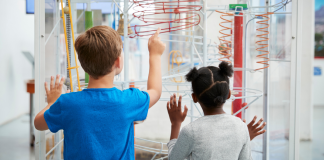 The other day, my six-year old came home from school and asked me with big eyes: “Mommy, did you know a man took a gun and shot many, many people. They are all dead. Is this true?” Sadly, my dear boy, yes, it is true.
The other day, my six-year old came home from school and asked me with big eyes: “Mommy, did you know a man took a gun and shot many, many people. They are all dead. Is this true?” Sadly, my dear boy, yes, it is true.
As our kids get older and spend time in a more age-diverse environment, they are exposed to others’ opinions and political ideologies, hear news of tragic events, and come in contact with pornography, sex, and other topics that might go over their heads and that we’d rather avoid.
However, as much as we would like to protect our children from hearing or experiencing these issues, they are part of life. It is unrealistic to keep the “evil of the world” and this type of information from them, which leads me to ask: How do we talk about difficult or taboo topics to our children? The following paragraphs are based on my experiences (both personal and relating to my work) and discussions with my aunt who is an expert on this topic.
Listen and Engage
The first and most important step is to listen carefully what your child says and to be honest and open in your response. It is often easier to not want to hear and avoid the conversation, but I believe that it is our duty as parents to explain the world age-appropriately and prepare our children for difficult issues and life lessons. When my son asked me about the Las Vegas shooting, I first told him that sadly, what he had heard was true. I then asked where he heard this as the source of information can give some clue to the context in which this was discussed. In this case, it was a friend. He then asked why someone would do a thing like that. I honestly found it very difficult to find the right words.
Our conversation went something like this: “I don’t know why he did it. The police are trying to find out. Maybe he was sad or very angry, but that doesn’t excuse his behavior. It’s a very terrible thing that he did.” He then asked whether I would die and he would die and what would happen then. Again, I tried to be truthful and tell him that I don’t know what happens after death, but that he doesn’t have to be afraid because I love him and that he is young and healthy, for which I am truly grateful. At that point, he reacted like a typical six-year old – he gave me a smile, said ok, asked for a snack and whether I had seen his Pokémon cards.
Children don’t process the world the same as adults–they can be very sad and scared one minute and be happy and run around the next.
They live in the present, and they don’t focus as much on the past or the future as we adults do. Because of this different way in which children experience the world, their reaction to a tragic event, news, or difficult topic is often not what we would predict. Grief, for example, can be expressed as aggression or confusion and not just sadness and depression. It also means that what the child responds to is not necessarily the same issue that bothers us as adults.
We tend to focus more on the underlying causes leading up to a tragic event, whereas children’s focus is much more immediate, literal, and driven only by what they have seen or heard. Smaller children often ask very practical questions about death, destruction, and tragedy. They can’t yet comprehend the greater connections, e.g., what impacts them directly, the context of these difficult topics, and what is or isn’t connected.
Let the Child Drive the Conversation
Children are curious, spontaneous, and open. They are quickly amazed and believe in alternate universes. How children deal with difficult topics depends very much on how we as adults communicate with them. When having difficult conversations, it is important to focus on the child’s needs and let them drive the direction in which the conversation is going. It is crucial to listen carefully—what is the child saying? what is the underlying emotion?—and then respond both on a rational, issue-focused level and on a level addressing the child’s emotions. We shouldn’t have our expectations or preconceived notions determine the focus of the dialogue, but we must listen carefully and answer truthfully. If they are not satisfied by our answers, they will come back with more questions.
We, as parents, often live in the illusion that we can avoid suffering and, therefore, attempt to keep our children from experiencing distress, grief, and hurt.
This is a normal, human thing to do. However, when we don’t have difficult conversations, we don’t teach our children how to deal with suffering. For example, if we bury the beloved pet that died secretly without integrating our children, we don’t give them a chance to learn to deal with sadness and grief. If we don’t teach them about pornography, they are much less likely to know what to look for and how to react if they are exposed.
We should never avoid having these conversations, however difficult they might be, especially if the child is the initiator of the dialogue. To speak about death, violence, sex, differing political opinions, and human suffering means to speak about life. And life does include happy and sad moments, good and bad days, and easy and difficult conversations.











